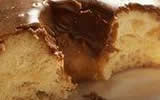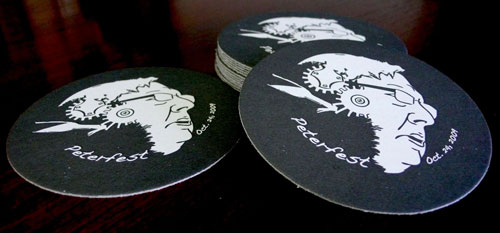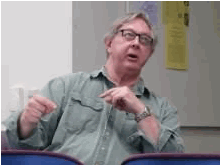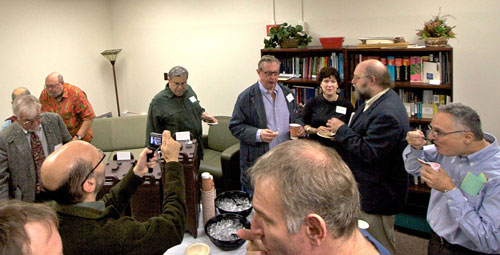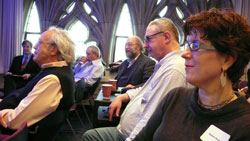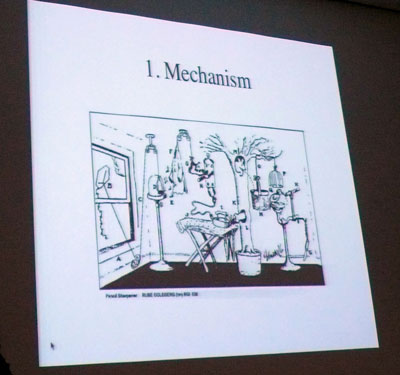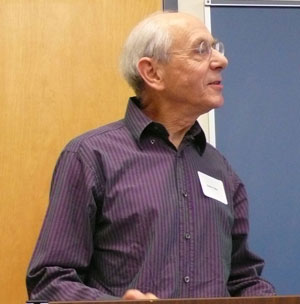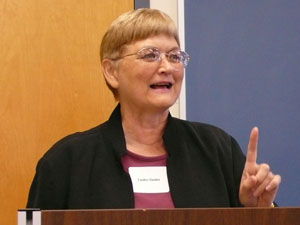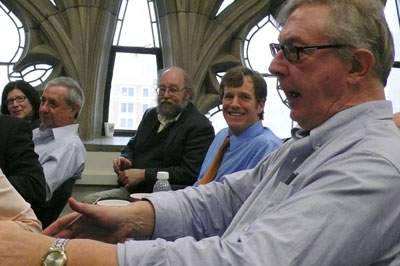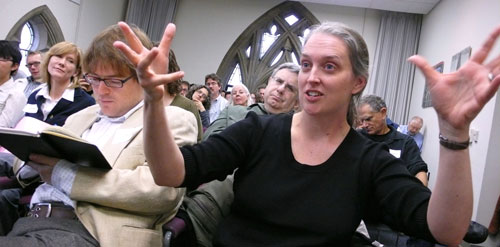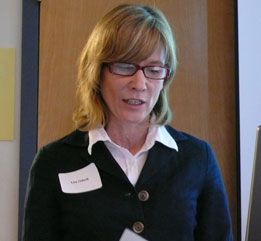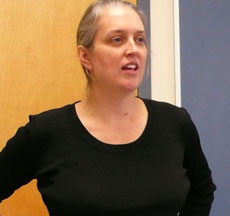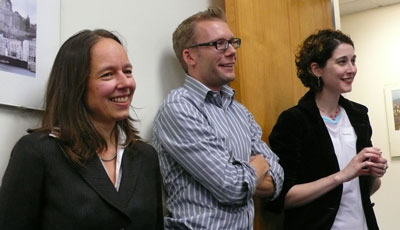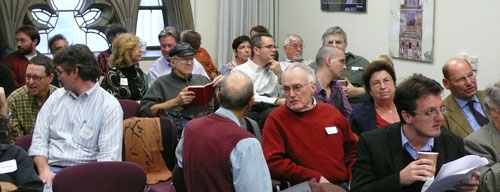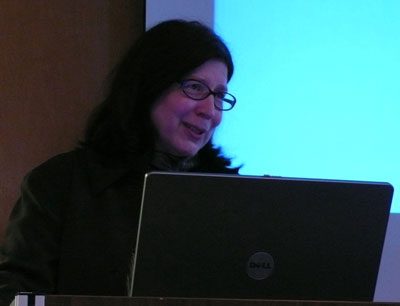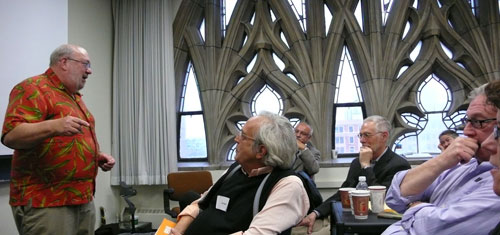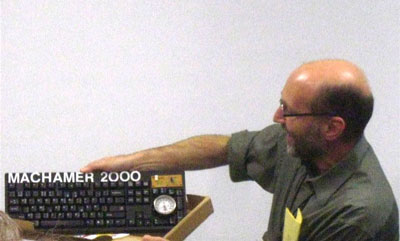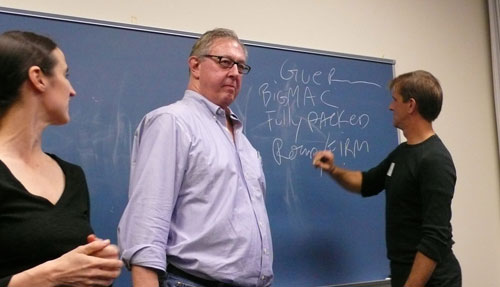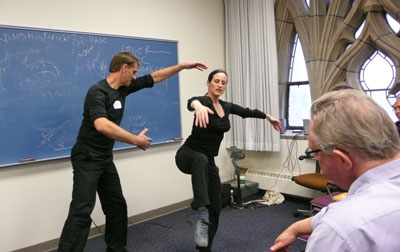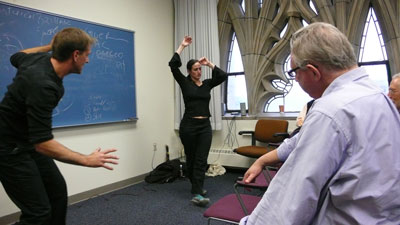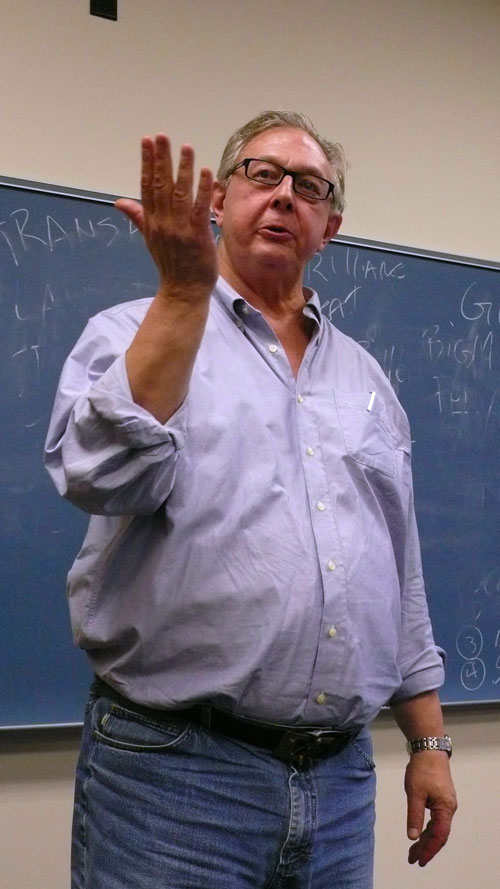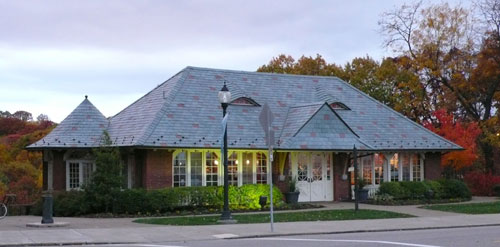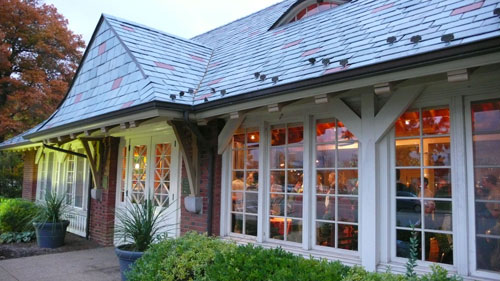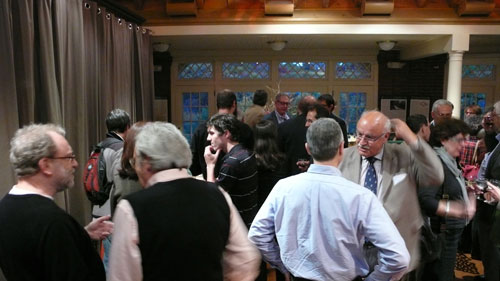::: center home >> being here >> last donut? >> peterfest |
||
Peterfest The idea that we should hold a gathering in celebration of Peter Machamer came from his former students, Carl Craver and Gualtiero Piccinini. There was no precipitating event. Peter is not planning retirement, as far as I know. It is just that Peter is such a beloved figure in the Department of HPS and the Center that the idea took fire. We have all, in one way or another, benefited from Peter's kindness, expansive knowledge and insight; and his infinite hospitality. And most of us have been on the receiving end of his questioning in a talk, memorably framed by wild gestures and flapping hands. It is a trial that bonds us.
We assembled in the Center coffee lounge for breakfast at 8:30 am. It was remarkable. Here was a group of people assembled from across the globe with one purpose, to honor their teacher, colleague, mentor and friend. We had over 70 registrants, some crossing the Atlantic just to attend, even though they were not speaking. I will not try to mention everyone. Since some of you reading this will wonder just who was there, we are appending a list of registrants at the end. What was remarkable was not that this group should assemble, but that Peter was there, before 9 am, and even cheerfully so. I made sure to take a photo of Peter standing with Barbara to document this extraordinary occurrence. We had a program that was designed to start with academically weighty matters and slowly devolve into the cheer for which Peter is so well known. Carl and Gualtiero provided a fitting introduction to a room so packed that people were standing in the hallway. Carl captured our communal sense when he remarked: "Many teachers are forgettable." He paused just long enough for us to wonder how he would continue. "Peter is not forgettable." Then it was time for Peter's old friend, Dan Garber, to be introduced by another old friend, David Malament. Dan spoke on one of Peter's favorite topics, the mechanical philosophy. His claim was revisionist and interesting. The mechanical philosophy was born much later than we ordinarily think. It was actually Boyle, that epitome of mechanical philosophy, who made the philosophy in the 1660s by drawing past themes together. He was not its culmination but its creator. Dan documented this claim as carefully as he could in the few minutes the program allowed for an argument worthy of an afternoon. All the while he looked at Peter anticipating his reaction. Then Peter's moment came. He did not disappoint. "I don't think Boyle was a mechanical philosopher!" he boomed... and the room dissolved. This was followed by a regress into greater and more amusing hyperbole. "Bacon was a nutcase." None dare challenge this lest the regress achieve new heights of greatness. After our coffee break, we returned for the "mechanism" session. Here we would hear from Peter's more recent collaborators and students. Lindley Darden was introduced elaborately by Bob Olby, who has become less visible in his retirement. "I'm still around," he quipped. We surely know that, I mused. We are about to celebrate Bob's new, magnificent Crick biography with a miniworkshop! Lindley devoted her time to telling us the story of the paper she, Peter and Peter's student, Carl Craver, had published in 2000, "Thinking about Mechanisms." This paper has become a classic, known as "MDC," and is now the starting point for many investigations. It has become the journal Philosophy of Science's most cited paper, on its own count. It is cited even more often, Lindley assured us, than the venerable Hempel and Oppenheim paper. We sat back while she recounted in detail the meetings and labors that went into its writing. There was the small time window in which it could be written: after 1pm since Carl was playing nights in a rock band; and before 4pm, since that was Peter's cocktail hour. Most intriguing was the story of its trials at the hands of the referees. It was originally sent to Philosophy of Science in 1998 and rejected ("revise and resubmit") on the strength of two referees' reports and, Lindley thought, by an editor who was known to be unsympathetic to the notion of mechanism. This story surely brought comfort to the room. We all send out papers to journals to meet the scrutiny of referees. We all know that feeling of helplessness when the reports are negative. The product of much thought and labor has been measured and found wanting by judges whose names we do not know and whose faces we cannot see. Then there was a new editor at the journal. Lindley remarked that she had been on the selection committee. She said nothing more but we made the inference and a titter passed through the rows of seats. This time the paper was accepted and history was soon made. The floor was now turned over to Peter's collaborators and students, introduced by Gary Hardcastle. We heard brief presentations from Lisa Osbeck, Jim Bogen, and Heather Douglas. Heather painted a vivid picture of Peter reassuring her that the wild topic she'd chosen for her dissertation could indeed be studied in a Department of History and Philosophy of Science. All this was over a steaming plate of ostrich at Tony Pais' Baum Vivant restaurant in the summer of 1996. Jim Bogen reported an occurrence many of us imagined could not happen. In the 1970s he'd visited Peter at Ohio State. He'd asked Peter a question and, to his astonishment, Peter just sat in silence, said nothing, sat longer and then eventually capitulated by inviting Jim for a drink. What was the question? "Tell me what causality is." How times have changed. Our first speaker after lunch was introduced by Edouard Machery. The speaker was an old friend of Peter's, Aristides Baltas, and he had made the trip from Athens for the event. He was to speak on "Peter Machamer and the Mind-Body Identity Thesis." Aristides, I knew from earlier events, was a careful and thorough philosopher. He would read his talks from manuscripts, with sentences laden with distinctions and careful analysis. His talk began. There was Spinoza and minds and bodies and identity and ontology and epistemology. The room was warm and crowded and I was full from lunch. So I settled into my chair, not intending to follow too closely. Then I began to sense it. There was something not quite right. He was not reading from a manuscript, but speaking rather freely from notes. Was this talk what it seemed? Then I saw it. "Peter has a rather big body. So the mind body identity thesis would suggest he has a big mind..." There was the tip off. This was all a magnificent parody! So as not to fall out of character, Aristides backed away and began to carve up the many senses of "big." The next session was devoted to an appreciation from three of Peter's students, Uljana Feest, Erik Angner, and Jackie Sullivan, introduced by a fourth, Zvi Biener. I cannot now recapture for you the affection and gratitude that they expressed for Peter. Each spoke from the heart of how important Peter had been to them. And each managed to intersperse their remarks with enough humor that we never quite knew when to laugh or applaud. Jackie Sullivan won my award for the best observation. She noted that, for Peter, "sh*t, screw and f*$K"--here transcribed exactly from her Powerpoint slide--are technical terms in philosophy. It did not stop there. They are all both nouns and verbs, an unusual property for such a set. This, she felt, must be the origin of Peter's celebrated claim that activities can be entities! The plan had been to hold an academic workshop in honor of Peter. The last few items on the agenda had drifted from academic content to pure celebration. In the final moments of the coffee break before Sandy Mitchell was to speak, I chatted with her at the podium. She had prepared a detailed critique of Peter's view on mechanism. It was a solid and serious academic paper and she was now starting to worry that it was out of place. I reassured her that, as far as I was concerned, it was just the corrective we needed. We should move back to the academic content and, I admitted to her, I was a little weary of the unmixed celebration of mechanisms. While MDC were justly praised for opening a new approach in the literature, I'd always been dissatisfied with their conception of mechanism. Its character was never properly explained. Instead we are flooded with synonyms and that somehow is supposed to make the notion clear. What am I to make of something being "productive" if that is an unanalysed primitive? John Earman's introduction to Sandy made clear that he too felt it was time to stop lionizing and, as he put it, start roasting some lion meat. Sandy's critique was excellent, I thought. She was bravely pulling the tails of the entire pride of the mechanism lions, all present in the room. She recalled for us the old notion of laws as regularities and the associated notion of causation as regular connection. Her own pragmatic view of laws precluded universal regularities, but still depended on lesser regularities that obtain with restrictions. Could MDC do without this reduced sense of regularity? How were mechanisms to be understood as productive if they didn't work their magic regularly? She quoted the authorities who were flirting with the idea of dispensing with regularity from the conception of mechanism. That would leave the notion of mechanism a bare proclamation of productive activities, with no further analysis of what that meant. But if one allowed that restricted regularity was essential? Then MDC was being driven towards Sandy's own pragmatic view of laws. Mechanisms were now something less than the notion that would replace laws as our conceptual starting point. Sandy continued with further probings and concluded with a short question time. The issue was not whether MDC would dispute, but whether they could phrase their rejoinders tersely enough to blunt Sandy's barbs in the few moments remaining in the program. We now came to the closing events. I chaired a "toast and roast" by Ted McGuire, Rick Grush, Jim Woodward and George Gale, in which they turned their formidable, combined wit onto Peter. Forgive me, but some events are best left largely unrecorded. It's closing moments, however, included the presentation to Peter of a small gift. It had been conceived in the Center and manufactured by Dennis Pozega. It was presented to Peter in mock seriousness as a prototype device for people who like to email late at night. It was labeled in large letters "Machamer 2000." I held it up and pointed to its parts--a gauge, a circuit board--all the while puzzling over its function. And then I let the plastic blowing tube slip into view from behind the keyboard. Peter has long been friends of the dancers of Attack Theater, Michelle de la Reza and Peter Kope. They were now to conduct a performance in Peter's honor in the crowded space at the front of the room. Those who did not know them were, perhaps, expecting something fully worthy of an amateur talent night. They did not know that Peter and Michelle are modern dancers of international stature. Their choreography came from us in remarks called out and written on the blackboard. They were translated into the individual moves of Peter's dance and finally combined with music. As the finished dance proceeded, Peter leaned forward in response to its magnetic pull. When it was over, Peter went to the front of the room and turned to speak. He began to express his thanks to us all. But he could not finish. For the second time in decades, Peter was at a loss for words. He took his seat. For all of us, this was the moment. We had joined to honor and thank our teacher, friend, colleague and mentor. We knew now that we had succeeded. We adjourned to a reception at the Visitor Center in Schenley Park. John D. Norton Registrants:
|

